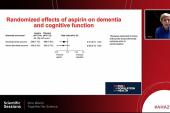No Hints of Cognitive Defects With ARNIs in HFpEF: PERSPECTIVE
The data show worrisome rates of cognitive decline in HF patients overall, but no signs that sacubitril/valsartan is to blame.

BARCELONA, Spain—(UPDATED) There are no signs that sacubitril/valsartan (Entresto; Novartis) has any negative impact on cognitive function in people who have heart failure with preserved ejection fraction (HFpEF), at least over a 3-year period, when compared with HFpEF patients taking valsartan alone.
That’s the key takeaway from PERSPECTIVE, a randomized, controlled trial that subjected participants to a battery of tests to assess the three main cognitive domains: attention, episodic memory, and executive function. It showed no more hints of cognitive deterioration among patients randomized to the angiotensin receptor-neprilysin inhibitor (ARNI) than to those randomized to the ARB alone. Serial PET imaging in a subset of patients actually revealed a trend towards less amyloid β deposition in the ARNI-treated patients.
“This study, I think, should remove any concern about the safety of neprilysin inhibition related to cognition,” presenter John McMurray, MD (University of Glasgow, Scotland), said here at the European Society of Cardiology Congress 2022. “It's questionable whether there really ever was a safety concern, but it had been raised and I believe that we've addressed it. I hope that means that more people with heart failure can be treated with sacubitril/valsartan because it has many benefits, and in patients with heart failure with reduced ejection fraction, that includes an improvement in survival.”
This trial, McMurray noted, studied patients with midrange and preserved ejection fraction—it wouldn’t have been ethical to randomize heart failure patients with reduced ejection fraction to valsartan, he said—but there is no reason to think that the lack of cognitive side effects would be any different across the spectrum of heart failure.
Indeed, he said, “these results may also open new avenues for use of sacubitril/valsartan. It is a very potent blood pressure-lowering drug, and it might be useful in hypertension. It’s use in hypertension really hasn't been developed because of this cloud about potential cognitive problems. Hypertensive treatments are given for a very long time; you would never want to give treatment that might cause cognitive dysfunction.
In a more-sobering takeaway from the study, however, McMurray noted that subtle cognitive dysfunction was “remarkably common” among the patients in PERSPECTIVE—affecting almost two-thirds of patients in the trial. “We really don't know why it occurs, [and] we need to find out,” he said.
Required by Regulators
At the time sacubitril/valsartan was approved for use in HFrEF, regulatory bodies, including the US Food and Drug Administration, requested a randomized study checking for any neurocognitive signals. The impetus, McMurray explained, stems from the fact that sacubitril inhibits neprilysin, which is one of a host of enzymes involved in the degradation of amyloid β peptides, one of which (Aβ 1-42) has been linked to Alzheimer-type dementia. Sustained neprilysin inhibition increases concerns that amyloid β peptides might accumulate, he said.
This study, I think, should remove any concern about the safety of neprilysin inhibition related to cognition. John McMurray
PERSPECTIVE enrolled just under 600 patients, randomized equally to the ARNI or the ARB. Anyone with prior known cognitive deficits was excluded from the trial.
At 36 months, results on the CogState global composite score capturing all three cognitive domains were no different between groups, which mirrored each other at time points throughout the 3-year follow-up. In a subgroup of 491 patients who underwent amyloid imaging, patients taking sacubitril/valsartan actually had less evidence of amyloid β deposition compared with those on valsartan alone.
This might just be the play of chance, McMurray noted, adding that he hopes the findings, taken together, will alleviate any concerns physicians might have about starting a patient on these agents, which have proved lifesaving in HFrEF patients.
To TCTMD, McMurray noted that prior studies have established that valsartan alone has no cognitive side effects and in fact might even be neuroprotective, so for sacubitril/valsartan to match this comparator is reassuring. What’s less clear, he said, is whether a 3-year follow-up period would be enough to detect any cognitive decline.
“We chose 3 years because in the lifetime of the patient with heart failure, that's a very large proportion of the remainder of their life,” he said, “and it was a balance between the feasibility of doing a study like this.”
Biykem Bozkurt, MD, PhD (Baylor College of Medicine, Houston TX), the scheduled discussant in the Hot Line session, congratulated the authors for completing the only randomized, controlled trial addressing cognitive dysfunction in this setting, calling the results “very reassuring.
“There are open questions, she continued—some of which additional analyses of PERSPECTIVE could address—including any differences in sacubitril/valsartan effects between midrange and preserved ejection fraction patients, or any signal of harm among carriers of the APOE4 gene, known to increase the risk of Alzheimer’s.
Indeed, Bozkurt said, while it was totally reasonable of PERSPECTIVE investigators to exclude patients with known cognitive problems or cerebrovascular disease, not knowing how these patients fare on an ARNI leaves open the possibility that those with higher baseline risk might be more susceptible to amyloid β deposition.
“In Alzheimer’s disease, very subtle and small changes in cognitive dysfunction and amyloid β become detectable over decades, usually preceding a diagnosis: whether 3 years is adequate to detect these changes and rule out the long-term effects is debatable,” she commented.
Beyond ARNIs
McMurray called PERSPECTIVE the “hardest trial we’ve ever had to do.” Investigators did 1,200 brain scans to screen patients for entry, then performed serial scans at baseline and at 18 and 36 months—no mean feat in a heart failure population.
The “high prevalence of subtle cognitive dysfunction in patients with heart failure detected with a comprehensive battery of tests is notable and deserves further investigation,” McMurray concluded. Speculating during a press conference as to what might be driving this decline, he noted that it might just be a factor of aging—more than a third of patients in PERSPECTIVE were over age 75 (average age 72.4 years; 46.8% women).
“Of course, those are patients who are more susceptible to declines in cognitive function over time: they have more comorbidity, especially atrial fibrillation, and that's a particularly strong predictor of cognitive dysfunction,” McMurray said. Other possible contributing factors are reduced cerebral blood flow, inflammation, or hospitalizations. This last is one that McMurray said he finds particularly intriguing, pointing to studies documenting the cognitive decline seen in hospitalized patients. Cognitive function can take a long time to recover—if at all—once patients are discharged home.
Bozkurt, also highlighting the high proportion of heart failure patients found to have signs of cognitive deterioration, called for longer trials, but also, perhaps, “characterization of what happens to the brains of heart failure patients, regardless of the treatment.”
Shelley Wood was the Editor-in-Chief of TCTMD and the Editorial Director at the Cardiovascular Research Foundation (CRF) from October 2015…
Read Full BioSources
McMurray J. PERSPECTIVE: sacubitril/valsartan and cognitive function in HFmrEF and HFpEF. Presented at: ESC 2022. August 26, 2022. Barcelona, Spain.
Disclosures
- McMurray reports receiving funding to his institution , the University of Glasgow, for his work on clinical trials, consulting, and other activities from Alnylam, Amgen, AstraZeneca, Bayer, Bristol Myers Squibb, Cardurion, Cytokinetics, GlaxoSmithKline, Novartis, Pfizer, and Theracos; and having received personal lecture fees from Corpus, Abbott, Hikma, Sun Pharmaceuticals, and Medscape.





Comments